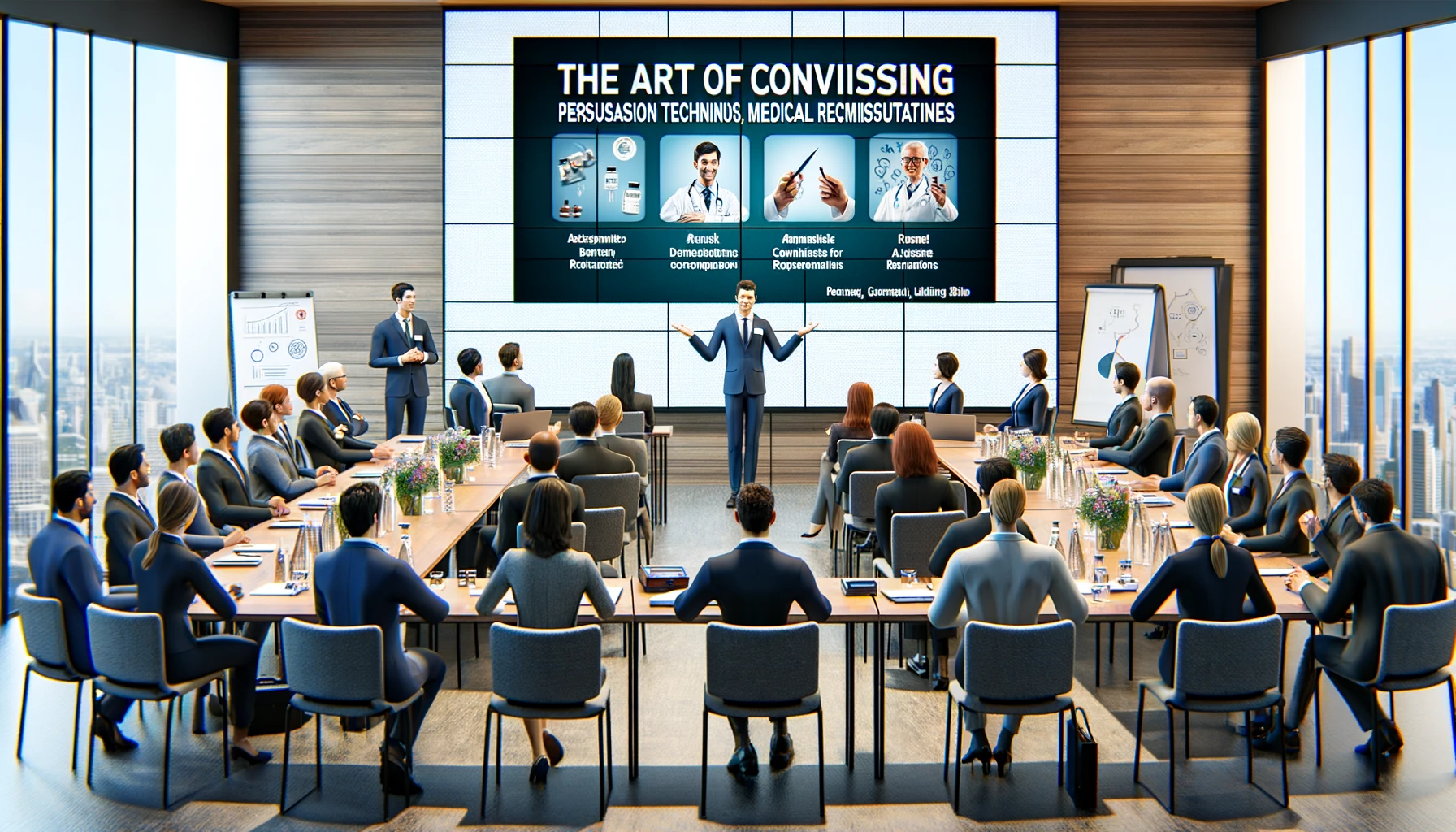In the dynamic landscape of the healthcare industry, the role of a medical representative (MR) is both challenging and vital. Medical representatives act as bridges between pharmaceutical companies and healthcare professionals, playing a pivotal role in disseminating information about pharmaceutical products, medical devices, and treatment options. In this ever-evolving landscape, Persuasion skills for medical representatives: the art of persuasion is a crucial.
The Importance of Persuasion Skills for Medical Representatives
The healthcare industry is built upon trust, accuracy, and efficacy. Medical representatives serve as conduits of information, tasked with conveying complex medical concepts to busy healthcare professionals while ensuring that the information resonates effectively. The ability to persuade is more than just convincing someone to accept a viewpoint; it involves crafting compelling narratives, establishing credibility, and forging meaningful connections. The success of medical representatives hinges on their capacity to persuade healthcare professionals to consider new treatments, adopt innovative solutions, and make informed decisions for patient care.
Recommended:Persuasion skills for medical representatives: The Art of Convincing
Understanding the Role of Medical Representatives
Medical representatives are entrusted with the responsibility of educating healthcare professionals about the latest advancements in medical science. This involves not only imparting knowledge but also navigating the challenges of time constraints, skepticism, and information overload. Effective persuasion is a tool that equips medical representatives to overcome these challenges and engage in meaningful dialogues that drive positive outcomes.
The Science Behind Persuasion
At its core, persuasion is rooted in behavioral psychology and persuasion theory. Understanding how cognitive biases influence decision-making can empower medical representatives to tailor their approach to resonate with the inherent tendencies of healthcare professionals. By leveraging psychological triggers, medical representatives can enhance the effectiveness of their communication and create a lasting impact.
Building Rapport and Establishing Trust
In the healthcare domain, trust is paramount. Medical representatives must focus on building rapport with healthcare professionals to establish a foundation of trust. Techniques such as active listening, empathy, and effective communication can go a long way in nurturing these crucial relationships.
Effective Communication Strategies
Communication is a two-way street, and medical representatives must develop active listening skills to truly understand the needs and concerns of healthcare professionals. Additionally, tailoring the message to the specific audience enhances the relevance and impact of the communication.
Using Emotional Appeals
Emotional connection is a potent force in persuasion. By tapping into the emotional aspect of decision-making, medical representatives can create a sense of empathy and resonance that makes their message more compelling.
Crafting a Persuasive Message
A deep understanding of the features and benefits of pharmaceutical products is essential. Presenting this information persuasively requires a blend of knowledge, storytelling, and communication finesse.
Leveraging Social Proof
Testimonials and case studies hold significant sway in decision-making. Medical representatives can leverage these forms of social proof to bolster their persuasive efforts.
Overcoming Resistance and Objections
Objections and resistance are par for the course. Medical representatives need to anticipate common objections and have strategies in place to address them while maintaining professionalism and credibility.
Building a Persuasive Presentation
A well-designed presentation can captivate an audience’s attention and convey information effectively. Engaging visual aids and storytelling techniques are powerful tools in the arsenal of a medical representative.
Developing and Enhancing Nonverbal Communication
Nonverbal cues, including body language and facial expressions, play a crucial role in establishing credibility and confidence. Medical representatives should master these cues to enhance their persuasive impact.
Gaining Insights from Neuro-Linguistic Programming (NLP)
Neuro-Linguistic Programming (NLP) offers techniques to enhance communication and influence. By understanding NLP principles, medical representatives can refine their persuasion strategies.
Personalizing the Approach
Healthcare professionals have diverse personalities and preferences. Adapting persuasion techniques to cater to these individual differences is essential for success.
Using Data and Evidence-Based Approach
In a field driven by evidence-based practice, integrating scientific research and data into persuasive conversations bolsters the credibility of medical representatives.
Ethical Considerations in Persuasion
The pursuit of persuasion should always be grounded in ethical principles. Medical representatives must strike a balance between persuasion and maintaining integrity, avoiding manipulative tactics.
Enhancing Collaborative Relationships
Collaboration is key in healthcare. Medical representatives should focus on fostering collaborative partnerships with healthcare professionals based on trust and mutual respect.
Measuring Persuasion Effectiveness
Metrics and indicators allow medical representatives to gauge the impact of their persuasive efforts. Continuous monitoring and improvement are crucial for refining persuasion skills.
Staying Updated with the Industry
The healthcare landscape is ever-evolving. Medical representatives must commit to continuous learning, staying informed about industry trends, innovations, and regulatory changes.
Summary
Persuasion skills are the cornerstone of success for medical representatives in the healthcare industry. From building trust and rapport to crafting compelling messages and overcoming objections, effective persuasion empowers medical representatives to navigate the challenges of their role with finesse.
FAQs
How long does it take to develop effective persuasion skills? Developing effective persuasion skills is a journey that takes time and practice. It involves mastering various techniques, refining communication, and understanding the nuances of human behavior. Consistent effort and a commitment to improvement are key.
Are persuasion techniques applicable to all healthcare professionals? Yes, persuasion techniques can be applied to a wide range of healthcare professionals, including doctors, nurses, pharmacists, and administrators. However, the approach may need to be tailored based on the specific role, preferences, and personality of the individual.
What if a healthcare professional remains unconvinced despite persuasive efforts? Not all interactions will lead to immediate persuasion, and that’s okay. It’s important for medical representatives to respect differing viewpoints and maintain professionalism. Persistence, continued relationship-building, and presenting additional evidence over time can eventually lead to positive outcomes.
In conclusion,
the art of persuasion is a potent tool that elevates the effectiveness of medical representatives in the healthcare industry. By mastering the techniques outlined in this guide and staying attuned to the evolving landscape, medical representatives can navigate their role with finesse, integrity, and impactful communication.


